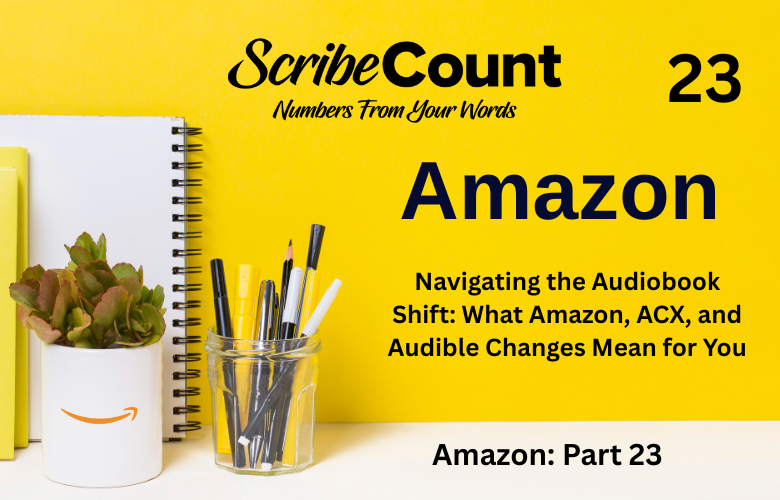The Evolution of ACX, Audible, and Amazon: A Changing Landscape for Indie Audiobook Authors
The world of self-publishing has evolved rapidly over the past two decades, offering authors unprecedented access to global audiences. One of the most transformative additions to an author’s toolkit has been the ability to create and distribute audiobooks, thanks in large part to platforms like ACX, Audible, and their parent company, Amazon. These services once seemed like a golden opportunity for indie authors, promising both reach and revenue. But over time, shifts in policy, royalty structures, and competition have revealed limitations that make these platforms less attractive than they once were. As the industry matures, new alternatives have emerged that give authors more control, better royalties, and a broader reach. Understanding the history and trajectory of ACX and Audible is essential for any author considering how best to publish their audiobook today.
The Origins of ACX and Audible: Promise and Potential
Audible, founded in 1995, was a pioneer in the digital audio space. Its mission was simple but ambitious: to make spoken-word content as ubiquitous as books, movies, and music. In 2008, Amazon acquired Audible for $300 million, solidifying its control over the growing digital audiobook market. With Amazon’s marketing muscle and Audible’s technology, the audiobook space rapidly expanded.
In 2011, Amazon launched ACX (Audiobook Creation Exchange) as a way to connect rights holders (authors and publishers) with narrators, producers, and studios. It was a revolutionary platform—an open marketplace where indie authors could either pay for narration upfront or enter into a royalty-sharing agreement with narrators and producers. ACX took the gatekeeping out of audiobook production, much like Kindle Direct Publishing (KDP) did for ebooks. Authors who had been priced out of audiobook production suddenly had a viable path forward.
At first, the terms seemed generous: authors choosing exclusive distribution through ACX and Audible received a 50% royalty, while non-exclusive distribution paid 25%. Distribution covered Amazon, Audible, and iTunes (through Apple). The revenue split for royalty-share deals was straightforward: the author and narrator split the royalties 50/50, incentivizing collaboration and growth in the indie audiobook space.
The Changing Terms and Decline of the ACX Deal
However, over the years, ACX made several changes that began to undercut its early promises. The first major shift came in 2014, when royalties for exclusive distribution dropped from 50% to 40%, and non-exclusive royalties dropped from 25% to 25% flat (unchanged). This move angered many authors and narrators alike, especially those who had promoted and built up the ACX catalog in its early years.
Another blow came in the form of return policies. Audible’s liberal return policy allowed listeners to return audiobooks for up to 365 days, no questions asked—even if they had listened to the entire book. For years, authors and narrators were not only unaware that these returns were happening, but they also weren’t compensated when an audiobook was returned. ACX provided minimal transparency, and it wasn’t until an outcry by authors in 2020 (under the campaign #Audiblegate) that Amazon and Audible admitted the scope of returns and agreed to make changes.
While Amazon has since promised to adjust the way returns are calculated and reported, many authors still report discrepancies, incomplete data, and unclear earnings statements. This lack of transparency stands in stark contrast to the detailed sales and earnings reports provided by platforms like KDP.
Additionally, authors using ACX face a seven-year exclusivity lock-in if they choose exclusive distribution—an unusually long commitment in a fast-changing industry. During that period, authors cannot publish their audiobooks anywhere else, including libraries, other retailers, or international distributors. While exclusivity offers slightly higher royalties, the loss of flexibility and exposure can significantly hurt long-term revenue potential.
Monopoly and Limited Reach
The centralization of audiobook production and distribution under the Amazon-Audible umbrella has created a near-monopoly. While Amazon boasts the largest market share in audiobooks—particularly in the U.S. and U.K.—its ecosystem is closed. ACX does not distribute to Spotify, YouTube, Google Play, Scribd, Kobo, or dozens of international outlets. This walled garden limits discoverability and leaves significant money on the table for authors who might otherwise reach new audiences.
Moreover, Audible’s subscription model and credit-based system have commodified audiobooks in a way that benefits Amazon more than authors. Listeners use credits to "purchase" audiobooks, and while the audiobook might be priced at $24.95, the author sees royalties based not on this list price, but on a hidden internal formula—making earnings unpredictable and opaque.
This is especially frustrating for authors with large catalogs or high-cost productions who are hoping for returns that reflect their investment. Coupled with non-transparent data reporting and shifting policies, many indie authors have begun to reevaluate whether ACX remains worth it.
The Rise of Alternatives: A New Audiobook Era
Thankfully, the landscape is no longer dominated by a single company. Over the last few years, numerous new platforms have emerged that offer authors more flexibility, higher royalties, and broader distribution. Services like Findaway Voices, Authors Republic, Soundwise, and Bookfunnel Audio have stepped in to offer alternatives to ACX, each with its own strengths.
Findaway Voices, now owned by Spotify, distributes to more than 40 platforms, including library services like OverDrive and Hoopla. They offer non-exclusive deals and higher royalty transparency. Authors can even sell their audiobooks direct to readers through Spotify or their own website—keeping up to 80-90% of the revenue.
Authors Republic is another aggregator that distributes globally with minimal barriers to entry, providing access to channels otherwise unreachable through ACX. Their royalty terms are clearer, and they too allow non-exclusive publishing.
Bookfunnel Audio, while a newer option, enables direct-to-consumer audiobook sales. Authors can sell DRM-free audio directly from their websites and keep most of the profit. This model benefits authors with established mailing lists and fanbases, offering independence from the whims of large corporations.
Abridged and subscription-only platforms like Scribd or Everand also provide additional visibility without locking authors into long-term deals.
The key shift is this: control has returned to the author. Whether through distribution aggregators, direct sales, or new subscription models, authors now have a range of tools to monetize audiobooks on their terms.
Conclusion: The Power of Choice
What once looked like a revolution in audiobook publishing—ACX and Audible—has become a restrictive and increasingly opaque system that no longer serves the interests of most indie authors. While the initial promise of easy access, large audiences, and fair royalties drew many creators to the platform, the reality has shifted dramatically over the past decade. Lower royalties, excessive exclusivity, poor transparency, and limited distribution have all contributed to a growing dissatisfaction.
Fortunately, authors are no longer without alternatives. A rich and diverse ecosystem now exists, empowering creators to take charge of their audiobook business. Platforms like Findaway Voices, Authors Republic, Bookfunnel Audio, and direct sales tools are not only viable—they are, in many cases, preferable. The modern indie author can now expand their reach, retain more rights, and earn higher returns without being tethered to the ACX-Audible-Amazon monopoly.
For those ready to dive deeper, every one of these new options, along with a detailed comparison of their features, royalties, pros, and cons, is covered in the Audio section of Author Resources. Whether you're just beginning your audiobook journey or looking to move beyond ACX, the information there will help you make the best decision for your publishing career.

